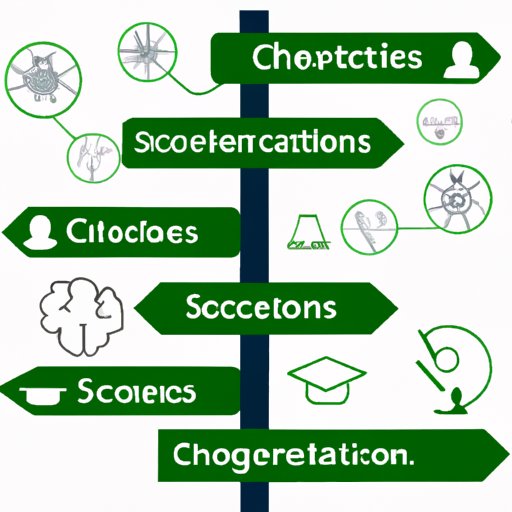Introduction
Pursuing a science degree can be an intimidating prospect. With so many options and potential career paths, it’s hard to know where to begin. However, a science degree can open up a world of professional opportunities, from research to teaching. To help you get started on your journey, this article will explore what science degrees are available and how to choose the right one for you.
Different Types of Science Degrees
There are many different types of science degrees available. Here are some of the most popular:
Biology
Biology is the study of life and living organisms. It covers a wide range of topics, from molecular biology to ecology. A degree in biology can lead to a career in research, biotechnology, medicine, conservation, or education.
Chemistry
Chemistry is the study of matter and its interactions with other elements. It’s a broad field, covering topics such as organic chemistry, physical chemistry, and biochemistry. With a degree in chemistry, you can pursue a career in research, manufacturing, or education.
Physics
Physics is the study of energy, motion, and force. It covers topics such as mechanics, electricity, and magnetism. With a degree in physics, you can pursue a career in research, engineering, or education.
Mathematics
Mathematics is the study of numbers, shapes, and patterns. It covers topics such as calculus, algebra, and geometry. With a degree in mathematics, you can pursue a career in finance, engineering, or education.
Computer Science
Computer science is the study of computers and their applications. It covers topics such as programming, algorithms, and data structures. With a degree in computer science, you can pursue a career in software development, artificial intelligence, or computer security.
Environmental Science
Environmental science is the study of the environment and how humans interact with it. It covers topics such as ecology, geology, and sustainability. With a degree in environmental science, you can pursue a career in research, conservation, or education.
How to Choose the Right Science Degree for You
Choosing the right science degree for you can be daunting. Here are a few tips to help you make the best decision:
Consider Your Interests
The first step in choosing the right science degree is to consider your interests. Think about the topics that excite you, and research the science degrees that cover them. Don’t be afraid to explore different fields; you never know what you might find.
Research Potential Programs
Once you’ve identified potential programs, do some research. Look at the curriculum and faculty, read student reviews, and reach out to alumni. This will give you a better understanding of the program and whether it’s the right fit for you.
Talk to Faculty and Alumni
Talking to faculty and alumni can be a great way to learn more about a program. Ask questions about the curriculum, internship opportunities, and job prospects. This will help you get a better sense of the program and its value.
Look at Job Prospects
Finally, consider the job prospects for the degree you’re considering. Research the industries that hire people with that degree, and look at the job titles and salaries associated with those positions. This will give you a better idea of what you can expect after graduation.

Examining the Benefits of Pursuing a Science Degree
Pursuing a science degree has many benefits. Here are a few of the most important ones:
Enhance Your Skills
A science degree can help you develop skills that are valuable in any profession. You’ll learn to think critically, solve complex problems, and communicate effectively. These skills will serve you well in any job you pursue.
Open Up Professional Opportunities
A science degree will open up a range of professional opportunities. You’ll have access to jobs in research, engineering, healthcare, and more. You may even have the chance to work in cutting-edge fields such as nanotechnology or biotechnology.
Increase Earning Potential
Finally, a science degree can increase your earning potential. People with science degrees tend to earn more than those without them. This is because the skills and knowledge gained from a science degree are highly sought after in the job market.

A Guide to Applying to Science Degree Programs
Now that you’ve chosen the right science degree for you, it’s time to apply. Here’s a quick guide to the application process:
Prepare Your Application Materials
To apply to a science degree program, you’ll need to submit an application, a personal statement, transcripts, and letters of recommendation. Make sure all of your materials are complete and accurate before submitting them.
Submit Your Application
Once your application materials are ready, submit them to the program. Be sure to check the deadline and make sure your application is submitted before then.
Get Accepted
After submitting your application, you’ll need to wait for a response. Most programs will notify you within a few weeks if you’ve been accepted or not. If you’re accepted, congratulations! You’re one step closer to pursuing your dream.

Understanding the Job Market for Those With a Science Degree
Once you’ve obtained your science degree, it’s time to start looking for a job. Here are a few tips to help you get started:
Explore Different Industries
Science degrees can open up a range of job opportunities in different industries. Explore different industries and research the job titles and salaries associated with them. This will help you get an idea of which industries might be the best fit for you.
Network and Build Connections
Networking is key when it comes to finding a job. Reach out to professionals in your field and build relationships. They can provide advice and introduce you to potential employers.
Take Advantage of Resources
Finally, take advantage of resources such as job fairs, online job boards, and career counseling services. These resources can help you find job opportunities and prepare for interviews.
Conclusion
Pursuing a science degree can be a rewarding experience. Not only will you gain valuable skills and knowledge, but you’ll also open up a world of professional opportunities. So if you’re considering a science degree, don’t hesitate. Take the plunge and explore the possibilities.
(Note: Is this article not meeting your expectations? Do you have knowledge or insights to share? Unlock new opportunities and expand your reach by joining our authors team. Click Registration to join us and share your expertise with our readers.)
